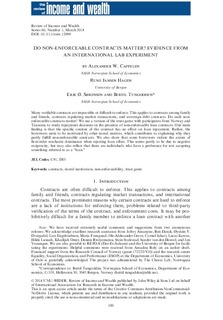| dc.contributor.author | Cappelen, Alexander Wright | |
| dc.contributor.author | Hagen, Rune Jansen | |
| dc.contributor.author | Sørensen, Erik Øiolf | |
| dc.contributor.author | Tungodden, Bertil | |
| dc.date.accessioned | 2015-03-04T12:20:49Z | |
| dc.date.accessioned | 2015-03-09T13:45:06Z | |
| dc.date.available | 2015-03-04T12:20:49Z | |
| dc.date.available | 2015-03-09T13:45:06Z | |
| dc.date.issued | 2014 | |
| dc.identifier.citation | The Review of Income and Wealth 2014, 60(1):100-113 | nb_NO |
| dc.identifier.issn | 0034-6586 | |
| dc.identifier.uri | http://hdl.handle.net/11250/278756 | |
| dc.description | This is an open access article under the terms of the Creative Commons Attribution-NonCommercial-NoDerivs License, which permits use and distribution in any medium, provided the original work is properly cited, the use is non-commercial and no modifications or adaptations are made.
© 2014 UNU-WIDER. Review of Income and Wealth published by John Wiley & Sons Ltd on behalf of International Association for Research in Income and Wealth. | nb_NO |
| dc.description.abstract | Many verifiable contracts are impossible or difficult to enforce. This applies to contracts among family and friends, contracts regulating market transactions, and sovereign debt contracts. Do such non-enforceable contracts matter? We use a version of the trust game with participants from Norway and Tanzania to study repayment decisions in the presence of non-enforceable loan contracts. Our main finding is that the specific content of the contract has no effect on loan repayment. Rather, the borrowers seem to be motivated by other moral motives, which contributes to explaining why they partly fulfill non-enforceable contracts. We also show that some borrowers violate the axiom of first-order stochastic dominance when rejecting loan offers. This seems partly to be due to negative reciprocity, but may also reflect that there are individuals who have a preference for not accepting something referred to as a “loan.” | nb_NO |
| dc.language.iso | eng | nb_NO |
| dc.publisher | John Wiley & Sons Ltd. | nb_NO |
| dc.rights | Navngivelse-Ikkekommersiell-IngenBearbeidelse 3.0 Norge | * |
| dc.rights.uri | http://creativecommons.org/licenses/by-nc-nd/3.0/no/ | * |
| dc.subject | contracts | nb_NO |
| dc.subject | moral motivation | nb_NO |
| dc.subject | non-enforceability | nb_NO |
| dc.subject | trust game | nb_NO |
| dc.title | Do non-enforceable contracts matter? Evidence from an international lab experiment | nb_NO |
| dc.type | Journal article | nb_NO |
| dc.type | Peer reviewed | nb_NO |
| dc.date.updated | 2015-03-04T12:20:49Z | |
| dc.subject.nsi | VDP::Samfunnsvitenskap: 200::Økonomi: 210::Samfunnsøkonomi: 212 | nb_NO |
| dc.subject.nsi | VDP::Social sciences: 200::Economics: 210::Economics: 212 | nb_NO |
| dc.source.pagenumber | 100-113 | nb_NO |
| dc.source.volume | 60 | nb_NO |
| dc.source.journal | The Review of Income and Wealth | nb_NO |
| dc.source.issue | 1 | nb_NO |
| dc.identifier.doi | 10.1111/roiw.12099 | |
| dc.identifier.cristin | 1149737 | |
| dc.relation.project | Norges forskningsråd: 179552 | nb_NO |

